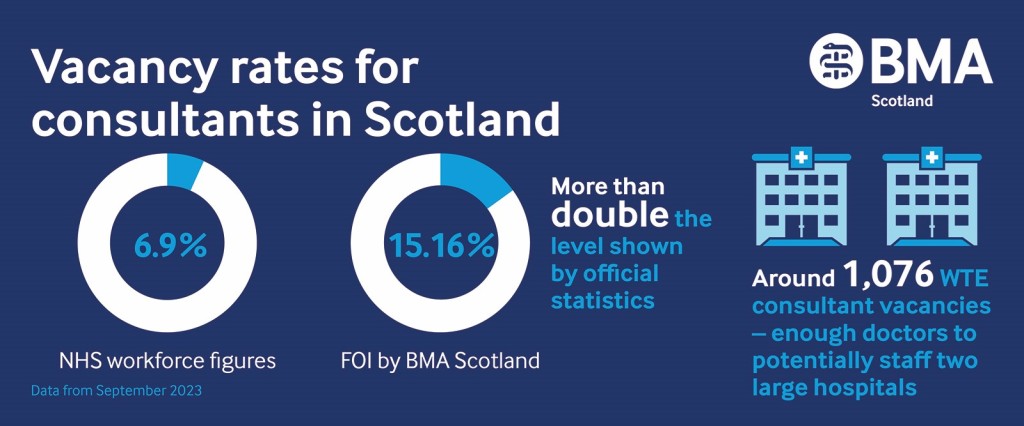Waiting lists for patients in Scotland are growing, with little progress on even the longest waits.
Accident and emergency waiting times are like those we would see in the depths of winter.
At the same time, the real level of consultant vacancies stands at more than 15%.
To be honest, you really don’t need to deploy any devastating insight to make a link between the struggles of our NHS and the gaps in our senior workforce.
However sometimes I do feel like I need to draw what would be the simplest of diagrams to make the point.
Just this week, we saw truly dreadful waiting times statistics which must be having a real and terrible impact on patients and their families. Those figures came just a couple of weeks after our FOI research (which received considerable media attention) showed a total of 1,076 whole time equivalent (WTE) vacancies across our NHS (compared to the 439 reported by official figures) – enough to staff two hospitals.

As you will have heard in our media coverage in the past few weeks – it simply won’t be possible to meaningfully tackle issues with waiting lists and NHS performance until we have a properly, fully staffed senior doctor workforce.
It was in this context that around 200 consultants joined the BMA Scottish Consultant Committee leadership team (myself, Dr Joanna Bredski and Dr Mark Steven) to discuss the urgent need to enhance pay for consultants in Scotland in an online meeting last week.
We found it a hugely useful session and you can watch our presentation back here.
Pay of course is far from the only factor that needs addressed to improve retention and recruitment, but it’s clearly a major and growing concern – and one that could be relatively quickly fixed. The presentation I gave on the night focusses on this and takes you right back to beginning of how we have arrived at the current position and the years of pay erosion we’ve suffered, including in comparison to other professions.
The graph below (courtesy of Dr Tony Goldstone) demonstrates this particularly clearly, taking 2009 as a baseline and showing what has happened to pay for different sectors over time compared to inflation (measured via CPI). You can see that although it dipped for all sectors in the immediate aftermath of the financial crisis, the recovery was much quicker in non-healthcare sectors and consultants and junior doctors have been the worst affected.

This was of course behind the increased dissatisfaction with the pay review process – which relied on the supposedly independent DDRB – and our decision to leave that process this year.
During the webinar we recapped the dire position of the senior doctor workforce, and the impact of a new deal for consultants agreed in England, which means Scottish doctors are now worse off than English colleagues. This is of course further compounded by the higher tax rates here in Scotland.
All that brings the current discussions about what this year’s pay award should be into sharp focus. Indeed, in a poll held in the meeting there was a very strong (90%+) indication that members would be willing to move to industrial action if a satisfactory pay increase is not forthcoming for 2024/25.
This reflects the kind of growing discontent we have been hearing from members and adds strength to our discussions with the Scottish Government. It is undeniably a shift from our last pay survey which indicated a degree of uncertainty around industrial action and hence has guided our strategy thus far.
It is on that basis that we have repeatedly emphasised to Scottish Government that genuine pay negotiations must start soon – and we have received assurances they will. However, as I set out in my presentation, the next meeting of the Scottish Consultants Committee is on 12th June and it will focus entirely on how we can best act to convince Scottish Government of the urgent need to enhance our pay.
It’s pretty clear that all options, including industrial action will be on the table at that meeting. And there’s no doubt that if the Scottish Government has still yet to enter negotiations by that point, then it will push us even further down the road of formal dispute and then ultimately industrial action.
I have written to the Cabinet Secretary to that effect just yesterday. I remain hopeful that we can avoid the need for such steps, but the window of opportunity where this will be possible is narrowing considerably – which would again indicate the urgent need to get productive negotiations underway.
In the meantime, there is much you can do to help strengthen your union and play a full part in the challenges ahead. First, I would urge you to remember your worth when you are asked to take on extra work and use the BMA Scotland rate card. Doing so helps you support each other and ensure that giving up your time is appropriately rewarded.
Second please do make sure your details with the BMA are up to date. Industrial action ballots are governed by rules that dictate we must reach a certain proportion of you to be successful – and we can only do that if the details we hold for you are up to date.

And finally – get involved. Its only through our joint activism and collective strength that we wield the power we need to make a difference. There’s a full list of your Local Negotiating Committees and how to reach them here – or simply use the QR code below. This is the way you can develop local contacts and build our strength across Scotland, from the grassroots up.

I’ll be back in touch after our next SCC meeting and indeed across the summer.
Dr Alan Robertson is Chair of BMA Scotland’s Consultant Committee

